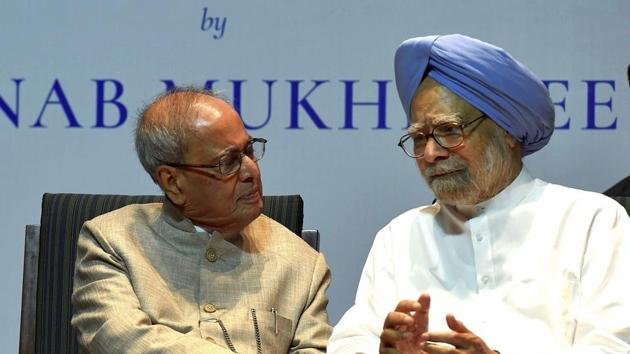Was Sonia Gandhi considering Manmohan Singh’s replacement in 2012?
At his book release function, Pranab Mukherjee decribed the Congress as a coalition in itself, as it brings all ideas on one platform.
Was Congress president Sonia Gandhi considering a replacement of Prime Minister Manmohan Singh in 2012, about two years before the general elections?

Then finance minister Pranab Mukherjee says that after a meeting with her on June 1 that year, he returned with a “vague impression that she might wish” to consider Manmohan Singh as the UPA’s presidential nominee. In the third volume of his autobiography, The Coalition Years, Mukherjee has written that at the meeting Gandhi had a “frank” discussion with him on a range of issues, including the functioning of the government and the Prime Minister’s Office, ways to improve the UPA’s image, the apparent distance between the party and the government and the lack of pro-activeness within the UPA, the ruling coalition.
“I thought that if she selected Singh for the presidential office, she may choose me as the prime minister. I had heard a rumour that she had given this formulation a serious thought while on a holiday in the Kaushambi Hills,” Mukherjee says in his autobiography that was released on Friday.
At that time the UPA government was facing severe criticism for what political adversaries and a section of political commentators called a “policy paralysis” leading to economic downslide. The UPA’s image had also taken a battering following a string of corruption scandals.
Mukherjee, in his autobiography, has made no bones about his prime ministerial ambitions. In 2004, after Gandhi had declined the PM’s post, he notes in his memoir, the prevalent expectation was that he would be the next choice for PM. Referring to media reports at that time about his unwillingness to work under Manmohan Singh, his junior when he was the finance minister, Mukherjee writes, “The fact was that I was reluctant to join the government and informed Sonia Gandhi accordingly. She, however, insisted that I should join the government since I would be vital to its functioning….” When the government was being formed, he was “absolutely clear” that he didn’t want the finance portfolio “since Manmohan Singh and I held different views on economic issues”.
In the run up to the 2007 presidential election, when Mukherjee’s name started doing the rounds, Gandhi called him to say that it was difficult for her to spare him as he was a strong pillar in the government and in Parliament. She was reluctant five years later, too. “Pranabji, you are most eminently suited for the office, but you should not forget the crucial role you are playing in the functioning of the government.”
Gandhi, however, changed her mind later after Mamata Banerjee and Mulayam Singh Yadav addressed a press conference to declare their presidential nominees—APJ Abdul Kalam, Manmohan Singh and Somnath Chatterjee. A day after their press conference, Gandhi decided to nominate Mukherjee who enjoyed good personal equations with leaders across party lines. And he proved it again as both Banerjee and Yadav relented later.





